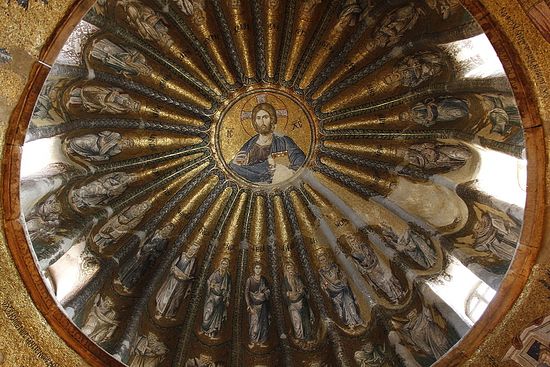 South dome of inner narthex at Chora Church, Istanbul, depicting the ancestors of Christ from Adam onwards. Photo: https://en.wikipedia.org
South dome of inner narthex at Chora Church, Istanbul, depicting the ancestors of Christ from Adam onwards. Photo: https://en.wikipedia.org The Reading from the Holy Gospel according to St. Matthew. (1:1-25)
In today’s gospel reading we are given a foretaste of the great feast of Nativity and the Christmas celebration. The evangelist St. Matthew has left a wonderful present under the tree and he teases us to contemplate it and think about it and perhaps even to peek into it and discover something of the mystery of this joyous feast.
It all sounds very exciting and yet we are confronted with a passage that many believe is one of the most boring passages in all of the gospels. How can this be? It is because what might look boring in this passage is actually the sign of the Lord’s entrance, or rather, our entrance into the Lord’s salvation. This is something that is far from boring! It is quite literally the history of the Jewish people and of the whole of Scripture and St. Matthew is tracing and weaving a story that ultimately finds it’s meaning and purpose in the child who is born to the Virgin Mary who is betrothed to Joseph, who is himself from the line of David the King.
This passage tells us so much but most important of all are three points:
First, we find that Jesus is actually of Jewish heritage since he is from the lineage of Abraham. This is important because the long-awaited messiah, the anointed one of Israel was expected to be Jewish.
Second, we find that Jesus is indeed part of the lineage of David the king. Why is this important? Because it was long understood that the messiah would not only be a Jew, but he would be a king. In order for this to be true he would have to be related to the kings who had come before him.
Third, and this is really by far the most important, this passage tells us without a doubt that the Lord Jesus Christ, the son of God and savior of the world, has a human nature that he takes from the Virgin Mary. The genealogy found in this passage is not simply a matter of tying together the loose ends of the history of Israel (though it does this quite nicely). It is ultimately there to show us that the Lord Jesus Christ entered into history as a man. He who formed man in His image and likeness now demonstrates that His love will bring Him to take upon Himself our image in order that we might grow in His likeness. If God did not become a man in the flesh, then our human flesh cannot be touched and healed by His divine power. It is a powerful rebuke to the gnostics who denied that Christ existed in the flesh and also believed that the body was inherently unclean and evil. St. Irenaeus wrote “How could we be joined to incorruptibility and immortality unless incorruptibility and immortality had first become what we are, so that the corruptible might be swallowed up by incorruptibility, and the mortal by immortality, so that we might receive adoption as children?” (Against Heresies 3:19,1)
The one who is God before the ages, will come into space and time and take a mortal body that He might share immortality with us. He who could not die, took on the flesh of man in order to ultimately take on death and give us His life. The evangelist reminds us that all of this did not happen suddenly in a vacuum. It was all foretold in the prophets of old “Behold, a virgin shall conceive and bear a son, and His Name shall be called Emmanuel.” The feast of Nativity is the celebration of God’s special entrance and presence into the world and among the human race. This feast is one of the everlasting signs of God’s love and our undying hope; God with us.
We turn on the news and we hear about tragedies. We speak to friends and hear about their difficulties. We see brokenness and suffering and we think to ourselves “What kind of a God would allow such things to happen in the world?” But before we can go further we are faced with the answer in the form of a baby wrapped in swaddling clothes, “What kind of a God would allow such things to happen in the world?” The God who loves us so much that He would come down and experience this world as one of us.
What kind of a God is this? The kind of God who so deeply desires a relationship with us that He didn’t wait for us to find a way to Him, but instead made His way directly to us. But He was not content be near us, rather He would not cease until He had united Himself with everything that it is to be human. He demonstrates this true humanity with complete obedience to His Father even unto death. And in uniting Himself with everything that it is to be human, He has actually given us the potential of becoming truly human.
To Him be the glory, now and ever and unto the ages of ages AMEN.

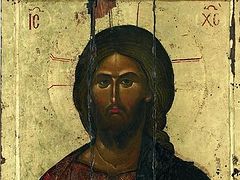
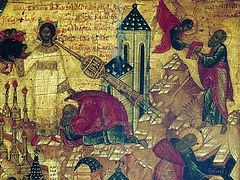
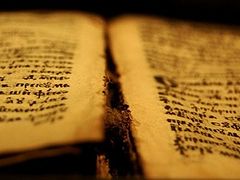
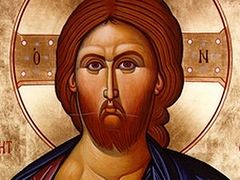
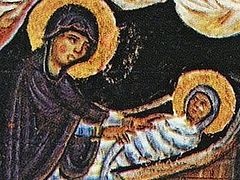
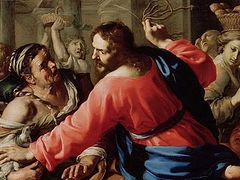
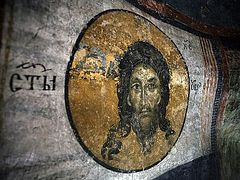
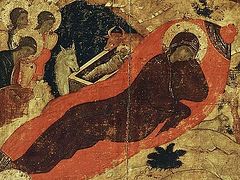
Seriously? Coming from an Orthodox website? The city's name is Constantinople. "Istanbul" does not exist in the eyes of God.
The Church was (and is) built by the blood of the Martyrs, upon unjust suffering and excruciable pains.
We are weak, miserable; the snares of this world penetrate so deeply in our flesh that this world is the only thing we are able to conceive, so that the loss of this earthly life appears as the ultimate loss.
As Christians, we know it is not so. The spirit indeed is willing, but the flesh is weak. It's for this that I pray to God: "Your will be done, but have mercy on the infinite measure of my misery and weakness; do not give me trials I cannot endure".
There are so many of them.....
I ceased to wear me with your same question some years ago, when I learned of a pious Greek woman, a widow with only one son, a little wonderful boy struck by a malignant tumor which were short of requiring his life. This woman prayed to God to save him, almost in anger, crying (in all truth!) her righteousness and piety. The next day the tumor had literally disappeared, leaving all doctors in amazement.
After a few years, this same boy, growed up and ended with bad companies, was killed by police after a violent crime he had just committed.
Indeed, where were we when He stretched out the curtain of the firmament far above the earth like a tent?
The answer is in our faith, that everything works for the good of those who struggle into salvation, the faith of Abraham who did not question when God required his only son, the faith in which all the nation are blessed.
Of course, we can imagine a thousands better ways, always forgetful that this world is fallen just because at the very beginning we thought we knew and could do best of the Almighty.
Sorry but this article does ABSOLUTELY NOTHING to answer the question it poses. I admit that this is a question that I am really struggling with at the minute which is why I was intrigued to read this article. Think about the 92 souls in the Russian choir who met an untimely death in the plane crash. What was their fault - having a God-given talent and using that talent to bring some joy to the suffering of Syria. I think about my friend Eric (please pray for him) - a young talented man in his early 30's, a physician with a young family, hit literally in one night with an incurable brain tumour; completely paralysed. Why? A God-fearing Christian. A good family. And yet SMACK. So much wrong, and so many innocent suffering. Ultimately answered I guess in the parable of the rich man and Lazarus, but still an almost impossible issue to grapple with by us mere mortals.